May 19, 2025 | 04:13 GMT +7
May 19, 2025 | 04:13 GMT +7
Hotline: 0913.378.918
May 19, 2025 | 04:13 GMT +7
Hotline: 0913.378.918
Phu Yen Province is considered the "cradle" of tuna fishing in Vietnam. The industry started in the area in 1994 when some fishermen in Ward 6, Tuy Hoa City learned the skills from Taiwanese counterparts. The Vietnamese fishermen even designed their own hooks that proved to be highly effective.
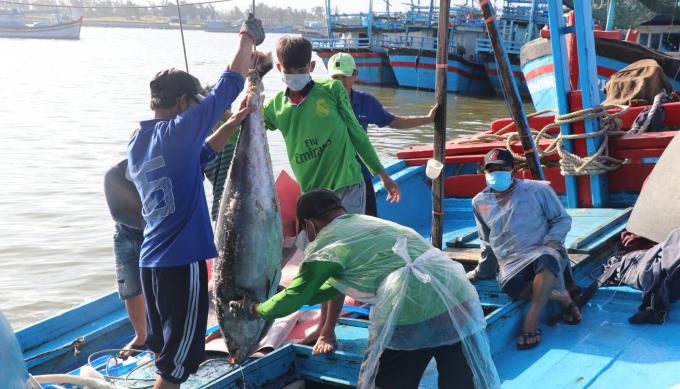
Phu Yen is the birthplace of tuna fishing in Vietnam. Photo: KS.
After that, the Department of Fisheries, now the Department of Agriculture and Rural Development of Phu Yen, invited experts from Taiwan and Japan to cooperate in providing technical guidance, making this profession thrived in the province from 1995 to 2012.
In 2012, the technique of catching tuna with hooks combined with light started to flourish and be pursued by many Phu Yen fishermen. However, neighboring provinces such as Binh Dinh and Khanh Hoa also switched to adopting the technique with a larger number of vessels and therefore have earned higher catches than Phu Yen.
According to the Phu Yen Department of Agriculture and Rural Development, though fishing vessels and tuna output in Phu Yen are lower than those of Binh Dinh, ocean tuna fishing is still one of the key industries and strengths of the province.
An assessment of the agricultural sector in Phu Yen shows that the tuna fishing industry in the area presently has a number of limitations and weaknesses in terms of ship structure, human resources, production organization at sea, fishing techniques, product preservation as well as ineffective value chain linkages.
Specifically, Phu Yen currently has 540 wooden fishing vessels, of which 447 vessels with capacity greater than or equal to 250CV that are specialized in catching tuna.
Most tuna fishing vessels are equipped with high-pressure lights, fishing equipment such as fishing receivers, radios, cruise monitoring devices VMS, VX-1700, storage tunnels.
Therefore, the technology of exploiting and preserving products on board is still outdated and manual, leading to low quality and value as well as decreasing efficiency.
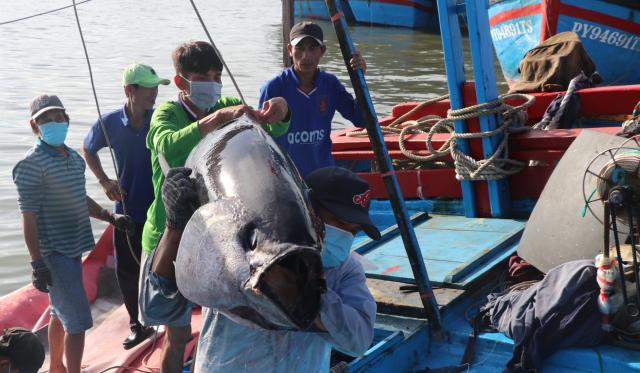
Tuna fishing in Phu Yen is increasingly lagging behind compared to other localities. Photo: MH.
The owners or captains of tuna fishing vessels have been professionally trained and have experiences in managing, operating, exploiting and preserving products. However, most of the crew members have no official training in such techniques.
Along with that, the rapid urbanization in coastal areas have led to the decrease and fluctuation in the number of laborers on tuna fishing vessels. This is also a major limitation that needs to be resolved in the near future.
Regarding the production, although tuna fishermen Phu Yen work in teams but without any specific contract or agreement of association to alternately transport products to shore, ensure quality, increase value and reduce shipping costs.
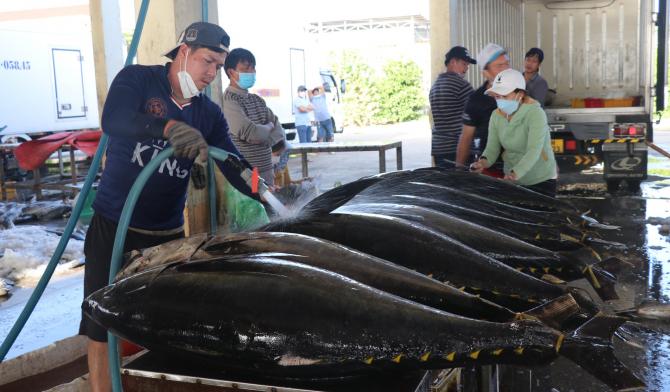
Tuna is sold at Dong Tac Port, Tuy Hoa City. Photo: KS.
Particularly, Phu Yen Province has not had a tuna auction market, causing difficulty for consumption and loss to local fishermen.
In addition, the logistics service facilities at the fishing ports have been irrelevant to the scale and auxiliary equipment while the canals, despite being innovated regularly, have unstable depth, affecting the departure and return of the ships at prime time. General assessment of seafood quality shows that the loss of tuna at fishing ports is about 20%.
According to Nguyen Tri Phuong, Deputy Director of Phu Yen Department of Agriculture and Rural Development, the province would reorganize teams of fishery occupations, including ocean tuna fishing, with an aim to regain the reputation of the birthplace of tuna fishing.
From there, the province could quickly grasp the information about fisheries management at sea and provide timely accurate marine meteorological information as well as fishing ground forecasts for fishing vessels...
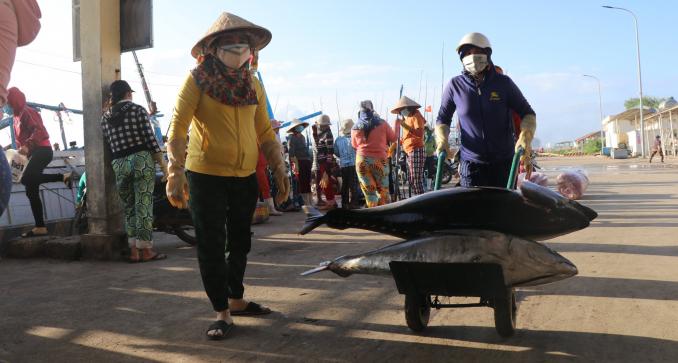
Tuna fishing creates many jobs for fishermen, including women. Photo: MH.
At the same time, the locality will also reorganize production by replicating typical exploitation models, chain links and effective cooperatives while supporting fishermen to apply scientific and technical advances in catching and preserving tuna products to improve fishing efficiency as well as product value.
"To do that, we will promote propaganda and vocational training for local fishermen," Phuong stressed.
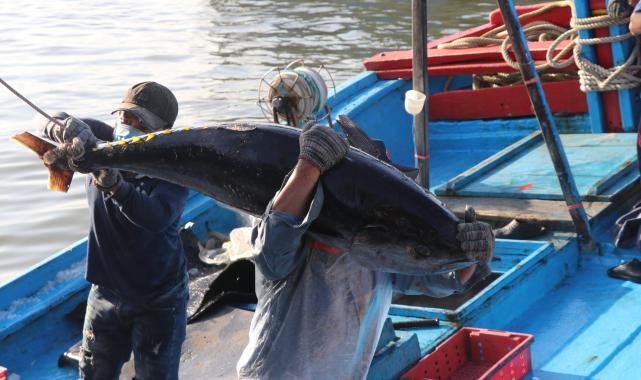
Phu Yen Province expects to have a tuna auction market soon. Photo: KS.
Notably, the province has recently signed a memorandum of understanding with Kiyomura Group (Japan) - a famous corporation in the tuna industry on cooperation in fisheries development. It is hoped that this cooperation in the near future will increase the value and sustainably develop the local tuna industry.
“We believe that this cooperation would bring out drastic changes in the tuna market, methods of fishing, catching, and prices of tuna in Phu Yen. Along with that, if the cooperation in investing in the tuna auction market at the tuna port matches idea of Kiyomura Group, multi-million dollar tuna auctions might take place in Phu Yen, added Phuong, revealing that Phu Yen fishermen caught a tuna that weighed up to 200-300 kg but sold it for only around VND100 million, which was very low compared to its value.
Translated by Phuong Ha

(VAN) Minister of Agriculture and Environment Do Duc Duy held a meeting with Soopakij Chearavanont, Chairman of C.P. Group, on May 15.
/2025/05/16/3800-0-nongnghiep-143756.jpg)
(VAN) Suntory PepsiCo Vietnam coordinated with the Ministry of Education and Training to implement an education program on water conservation, reaching nearly 1 million primary school students nationwide.

(VAN) Vietnam’s TH Group officially put its high-tech fresh milk processing plant into operation in the Russian Federation, marking a historic moment as the first TH true MILK cartons were produced in Russia.

(VAN) Use of high-quality broodstock and biotechnology is regarded as the most effective approach to ensuring sustainable and economically viable shrimp aquaculture ahead of climate change and the emergence of increasingly intricate disease patterns.

(VAN) Carbon farming is a form of agricultural practices that helps absorb more greenhouse gases than it emits, through smart management of soil, crops, and livestock.

(VAN) This is a key content of the Memorandum of Understanding recently signed between the Vietnam Fisheries Society and Kunihiro Inc of Japan.

(VAN) To achieve the goal, local authorities and businesses in Kon Tum province have fully prepared the necessary conditions for the new Ngoc Linh ginseng planting season.